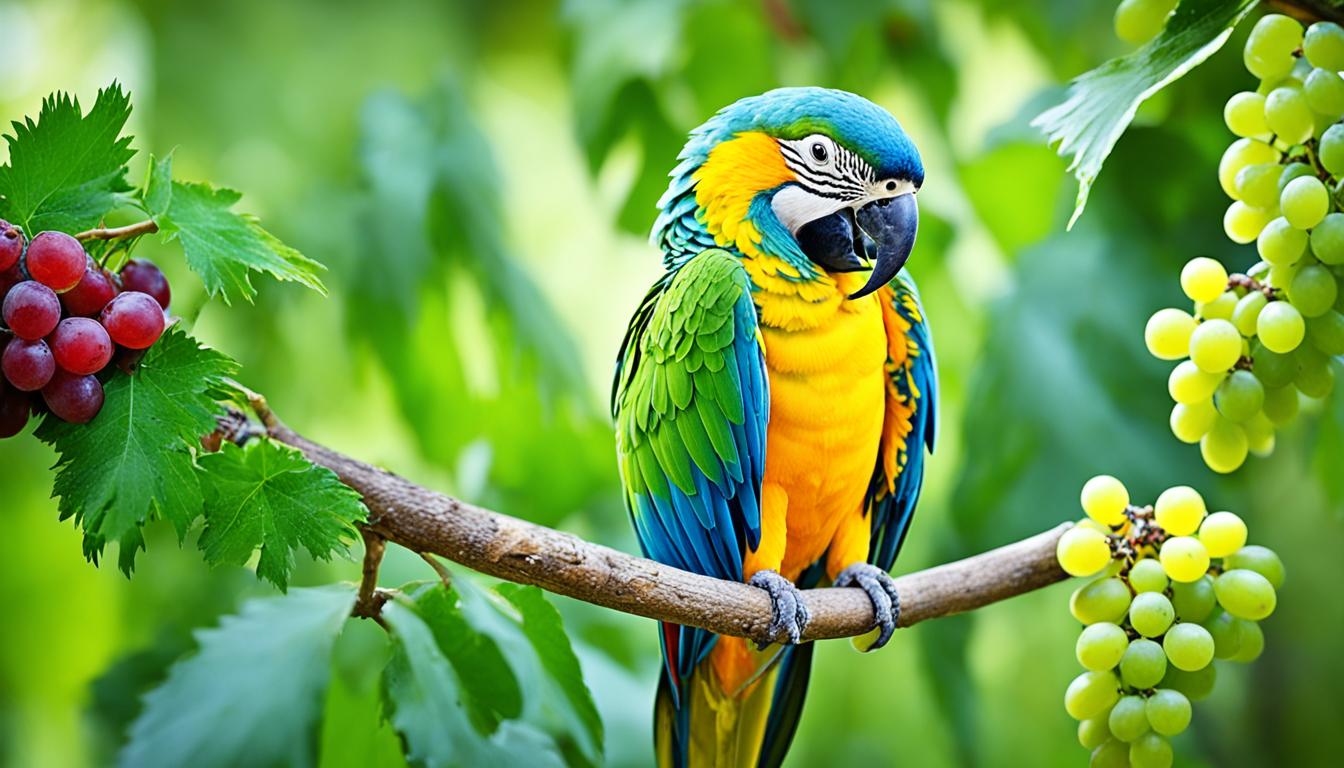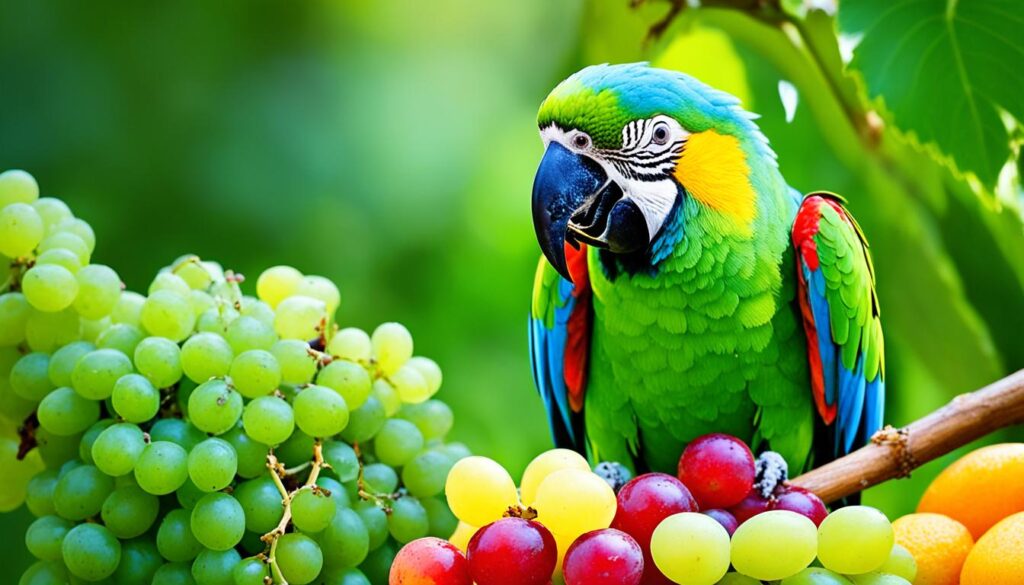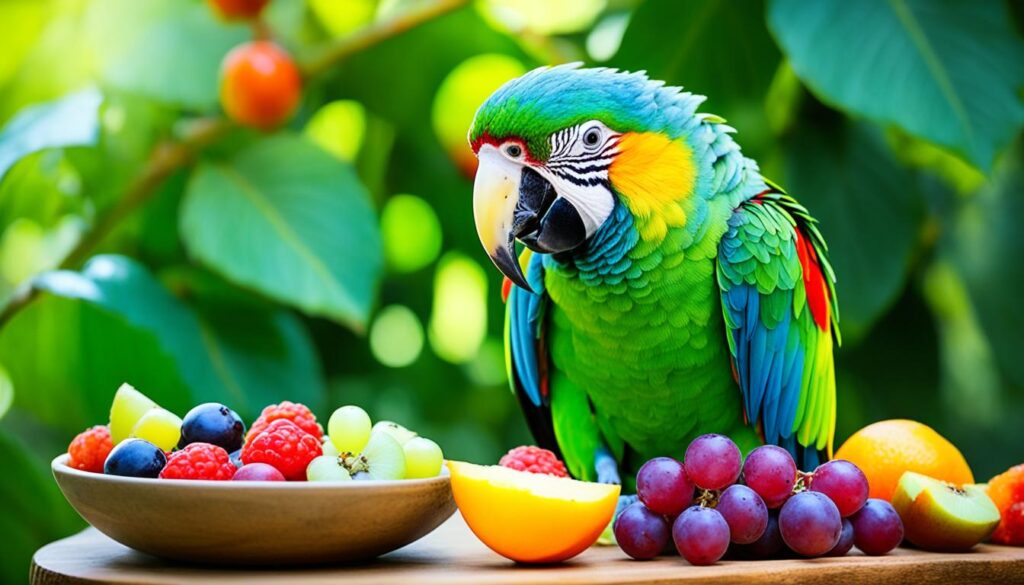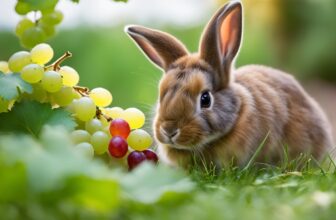Can Parrots Have Grapes? Safe Snacks for Your Bird

When it comes to feeding our feathered friends, many parrot owners wonder: can parrots safely enjoy the sweet, juicy goodness of grapes? As it turns out, parrots can indulge in grapes, but there are important guidelines to follow. In this article, we’ll explore the benefits and potential risks of incorporating grapes into your parrot’s diet, ensuring your beloved bird stays healthy and happy.
Key Takeaways
- Parrots can safely eat all types of grapes, including green, white, red, and black varieties.
- Grapes should be fed in moderation, as they are high in sugar and can lead to weight gain and other health issues if overfed.
- Grapes are a good source of antioxidants, vitamins, and minerals that can benefit a parrot’s overall health.
- Proper preparation and washing are essential to remove any potential pesticide residues on grapes.
- Grape seeds and peels may pose a risk, so it’s best to remove them before serving grapes to parrots.
Introduction to Feeding Grapes to Parrots
Parrots are known for their insatiable sweet tooth, and grapes are one of their favorite treats. These juicy, vibrant fruits provide a burst of sweetness that parrots find irresistible. Avian nutrition experts have long recognized the appeal of grapes for parrot diet and parrot fruit intake, as these birds possess a heightened sense of taste that allows them to fully savor the experience.
Why Parrots Love Grapes
Parrots’ natural affinity for grapes stems from their evolutionary adaptation to seek out sweet, nutrient-rich bird-safe fruits. The combination of the grape’s juicy texture and burst of sweetness makes it an alluring treat for these intelligent birds. Parrots’ ability to detect subtle flavors and their predisposition towards sugary foods contribute to their enthusiasm for grapes.
The Sweet Truth About Grapes and Parrots
While parrots can safely consume grapes, it’s crucial to understand the proper way to incorporate this fruit into their diet to ensure their overall parrot health. Responsible avian nutrition practices involve offering grapes in moderation and as part of a balanced, species-appropriate parrot diet. By doing so, parrot owners can harness the benefits of grapes while avoiding potential health risks associated with overindulgence.
In the following sections, we’ll delve deeper into the nutritional benefits of grapes for parrots, explore appropriate portion sizes, and discuss safe preparation and serving methods to ensure your feathered friend can safely enjoy this sweet treat.
The Nutritional Benefits of Grapes for Parrots
Grapes are not only a beloved treat for parrots, but they also offer a wealth of nutritional benefits that can contribute to your feathered friend’s overall health and well-being. From antioxidants to essential vitamins and minerals, this juicy fruit packs a punch when it comes to supporting avian nutrition.
Antioxidants in Grapes for Parrot Health
Grapes are brimming with powerful antioxidants, such as resveratrol, that can enhance heart health and protect parrot species against free radicals. These compounds help neutralize harmful molecules, reducing the risk of cellular damage and supporting a robust immune system. By incorporating grapes into a parrot’s diet, you can help your bird ward off various health issues and maintain optimal parrot health.
Essential Vitamins and Minerals in Grapes
In addition to their antioxidant properties, grapes are a rich source of essential vitamins and minerals that are crucial for avian nutrition. These include vitamin C, potassium, fiber, proteins, and manganese. These nutrients play a vital role in supporting bone development, immune function, and overall well-being in parrots. By providing your bird with a variety of fresh, nutrient-dense foods like grapes, you can help ensure that their dietary needs are met, leading to a healthier, happier companion.
| Nutrient | Benefits for Parrots |
|---|---|
| Vitamin C | Supports immune function, promotes healthy feather growth, and aids in wound healing. |
| Potassium | Helps maintain proper muscle and nerve function, as well as heart health. |
| Fiber | Supports digestive health and regularity, preventing issues like constipation. |
| Manganese | Plays a key role in bone development, metabolism, and antioxidant protection. |
While grapes are generally safe for can parrots have grapes, it’s important to remember that they should be fed in moderation to avoid potential issues like weight gain or nutrient imbalances. As with any treat, it’s essential to maintain a balanced diet and ensure that your parrot’s primary nutrition comes from high-quality pellets and a variety of fresh fruits and vegetables.
can parrots have grapes
Moderation is Key: How Many Grapes Can Parrots Eat?
Parrots can safely consume grapes, but it’s crucial to feed them in moderation. Excessive grape intake can lead to weight gain and nutritional imbalances in parrots. As a general guideline, small parrots can be given half a grape per serving, while medium to large birds can have a whole grape. Grapes should not be fed to parrots more than three times a week, and they should be thoroughly washed to remove any pesticide residue.
It’s important to ensure parrots maintain a balanced diet and do not solely rely on grapes as a primary food source, as this could result in vitamin deficiencies. Parrots in the wild primarily consume a diverse diet of fruits, seeds, nuts, and vegetation, making them herbivores or omnivores depending on the species.
While grapes are a safe and nutritious treat for parrots, providing them in moderation is key. Parrots should be offered a well-rounded diet consisting of approximately 60% pellets, 10% seeds and treats, and 30% fresh fruits, nuts, and vegetables to maintain optimal health and well-being.
| Parrot Species | Recommended Grape Intake |
|---|---|
| Small Parrots | Half a grape per serving |
| Medium to Large Parrots | One whole grape per serving |
It’s also important to note that while many parrots enjoy the sweet taste of grapes, certain foods like chocolate and avocado can be toxic to these birds and should be strictly avoided. Proper research and caution are essential when introducing new foods to a parrot’s diet.

By following these guidelines and providing a balanced diet, parrot owners can safely incorporate grapes as an occasional treat, allowing their feathered companions to enjoy the nutritional benefits while maintaining overall health and well-being.
Preparing and Serving Grapes to Parrots
When it comes to feeding grapes to your feathered friends, proper preparation is key. Parrots, like many other birds, can safely enjoy the sweet and juicy goodness of grapes, but there are a few important steps to take to ensure their well-being.
First and foremost, it’s crucial to thoroughly wash the grapes to remove any potential pesticide residue. Grapes, particularly conventionally grown ones, can contain harmful chemicals that could be detrimental to your parrot’s health. After washing, be sure to remove the seeds and peels, as these can pose a choking hazard or contain compounds that may be toxic to your bird.
For smaller parrots, it’s best to cut the grapes into smaller pieces to make them easier to consume and digest. Larger birds, on the other hand, may be able to handle whole grapes. When serving, you can offer the grapes as a standalone treat or incorporate them into a mix of other healthy fruits and vegetables to provide variety in your parrot’s diet.
It’s important to remember that grapes should only be offered in moderation, as they are high in sugar and fructose. Depending on the size of your parrot, they should only have half a grape to two grapes per day, or every other day. Overfeeding grapes can lead to obesity and other health issues, so it’s crucial to stick to the recommended serving sizes.
| Parrot Size | Recommended Grape Serving |
|---|---|
| Small (e.g., budgies, lovebirds) | 1/2 grape per day or every other day |
| Medium (e.g., cockatiels, conures) | 1 grape per day or every other day |
| Large (e.g., macaws, cockatoos) | 2 grapes per day or every other day |
By following these guidelines and properly preparing the grapes, you can safely and effectively incorporate this delightful fruit into your parrot’s diet, providing them with a tasty and nutritious treat that they’re sure to enjoy.

Conclusion
In conclusion, parrots can safely consume grapes as part of a balanced and varied parrot diet. Grapes are a nutritious fruit that can provide parrots with essential vitamins, minerals, and antioxidants. However, it’s crucial to feed grapes in moderation to avoid potential health issues like weight gain and nutritional imbalances.
By properly preparing and serving grapes, and ensuring they are part of a well-rounded avian nutrition plan, parrot owners can safely incorporate this sweet treat into their feathered friend’s mealtime. It’s important to remember that while grapes can be a delicious snack, parrots require a diverse diet to maintain optimal parrot health.
Ultimately, with the right approach and caution, parrots can enjoy the nutritional benefits of grapes while avoiding the potential risks associated with overconsumption. By following the guidelines outlined in this article, parrot owners can ensure their feathered companions continue to thrive and enjoy a healthy, balanced diet.







